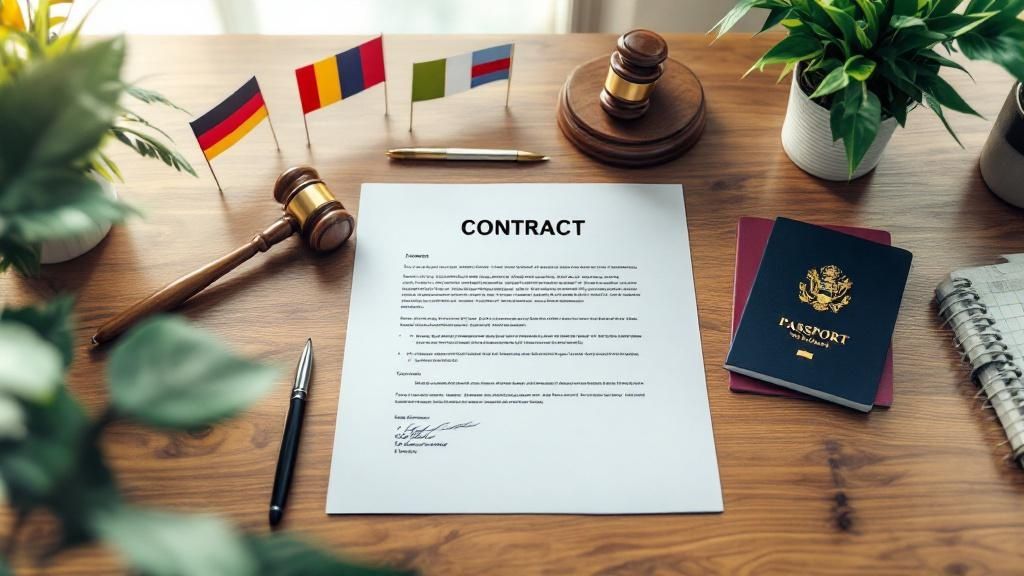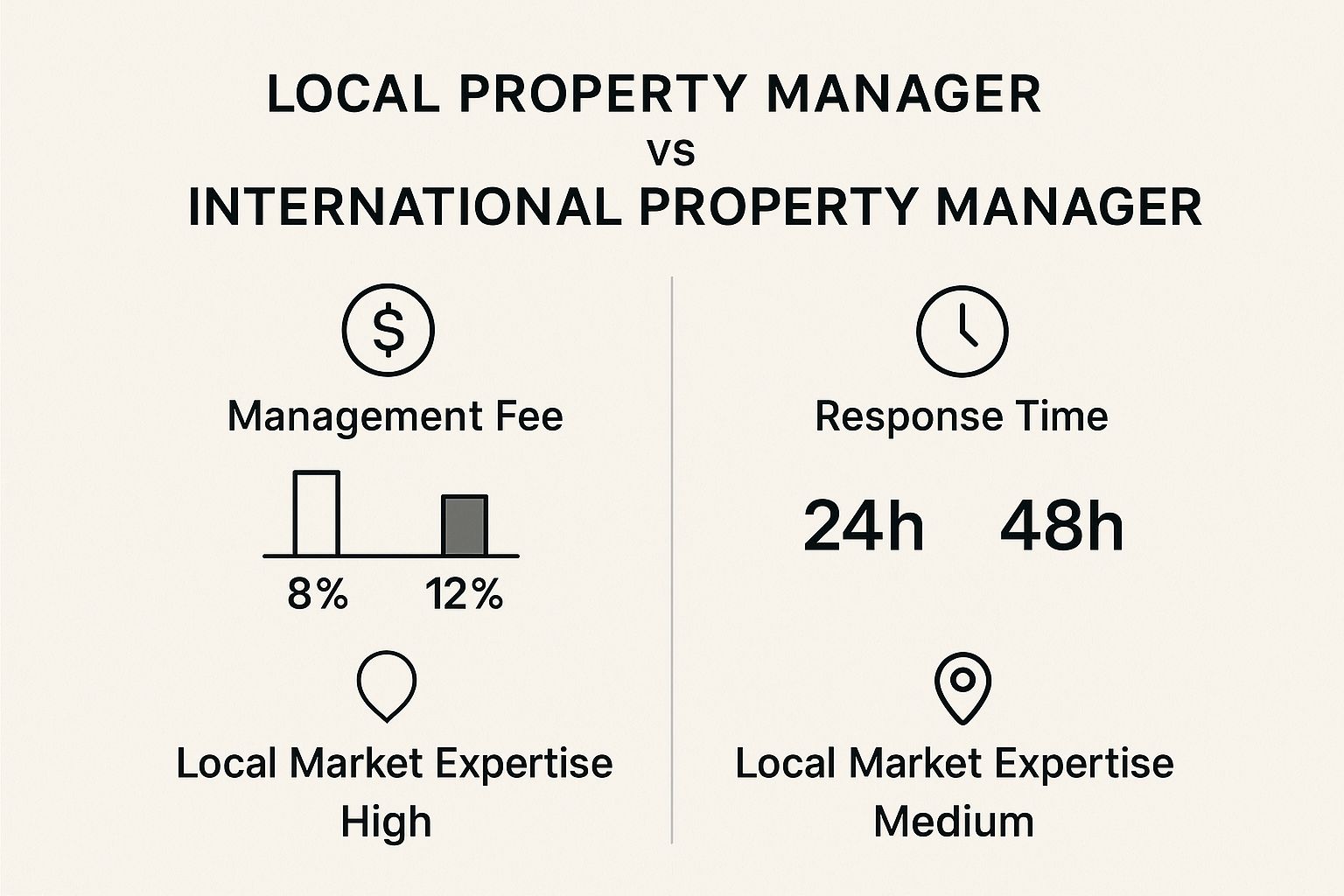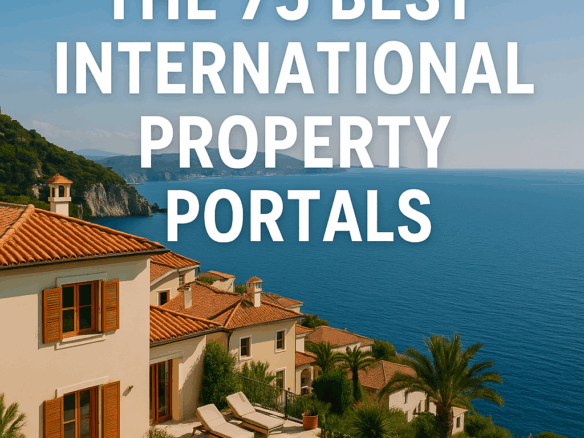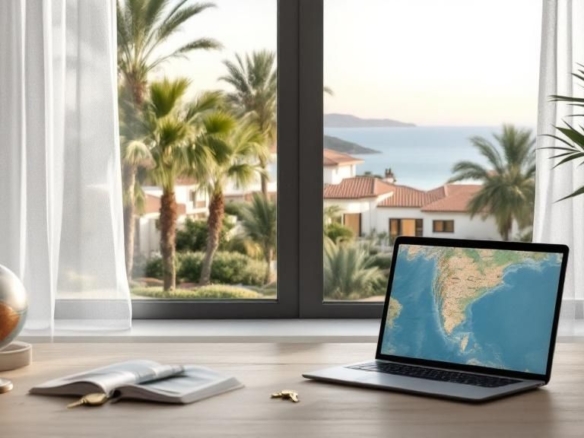Before browsing listings or calculating rental yields, the journey to buying property overseas begins with a crucial question: Why?
Your core motivation is the compass that will guide every decision you make. Are you chasing a high-yield rental investment, dreaming of a tranquil retirement home, or making a strategic move to diversify your portfolio? Clarity from day one is paramount. This guide is designed for sophisticated international property buyers, real estate agents, and seasoned investors looking to navigate the world’s most desirable markets.
Defining Your International Property Goals
Buying property overseas is a different league to buying down the street. You will be navigating unfamiliar legal systems, planning for currency fluctuations, and understanding local cultural nuances. Success isn’t just about finding a “good” property; it’s about finding the right property that perfectly aligns with your financial objectives and lifestyle aspirations.

What Is Your Primary Objective?
Your “why” is the foundation of your entire search. Are you an investor who lives and breathes by the numbers, or is this a heart-led decision with attractive financial perks?
- Investment-Focused Purchase: If your main goal is rental income or capital appreciation, your search will be data-driven. You will be zeroing in on locations with strong rental demand, high yields, and a stable economy. Think emerging hotspots in South America or established, blue-chip cities in Europe.
- Lifestyle-Oriented Purchase: For those picturing a holiday home or a retirement escape, personal taste takes the driver’s seat. Factors like the local climate, quality of healthcare, culture, and proximity to amenities become paramount. Your perfect spot might be a beachfront villa in the Caribbean or a quiet countryside retreat in Italy.
- Portfolio Diversification: Many high-net-worth individuals buy property abroad to spread their risk across different economies and currencies. This is a savvy strategy that requires a balanced approach, looking at both stable, mature markets and high-growth emerging ones to build a resilient global portfolio.
The global appetite for cross-border real estate is undeniable. Cross-border investments have shown remarkable resilience, indicating deep and growing confidence among investors to buy property across borders. You can read more about these global real estate investment trends and see how different regions are performing.
This short checklist can help you crystallise your initial thinking before you dive deeper.
| Initial Checklist for Buying Property Overseas |
| :— | :— | :— |
| Phase | Key Action | Why It’s Critical |
| Motivation | Define your “why”—investment, lifestyle, or diversification. | This sets the entire strategy for your search, from location to property type. |
| Budgeting | Calculate your total budget, including all potential taxes and fees. | Avoids financial surprises and ensures you’re looking at realistic options. |
| Location | Research 2-3 target countries based on your primary goal. | Narrows the focus and makes deep-dive research manageable. |
| Team Building | Identify the need for a lawyer, agent, and currency specialist. | A local expert team is your biggest asset and protection against costly mistakes. |
Getting these basics sorted first will save you a world of headaches down the line.
Assemble Your A-Team on the Ground
Attempting to go it alone is one of the biggest—and most common—mistakes people make when buying property overseas. You absolutely need a reliable, local team of experts. Think of them as your “boots-on-the-ground” network, acting as your eyes, ears, and legal shield in a market you don’t know inside and out.
“The single most important decision an overseas buyer will make is choosing their local team. An independent lawyer, a trusted agent, and a tax advisor who understands both local and home country regulations are indispensable. This team will protect your interests far more than any property listing ever could.”
– Nick Marr, Founder of Homesgofast.com and EuropeanProperty.com
Your essential team should always include:
- A Local Real Estate Agent: You need someone with deep-rooted knowledge of the specific neighbourhood you’re targeting, not just a general agent for the country. They’ll have access to off-market deals and provide priceless local insights.
- An Independent Lawyer: This is non-negotiable. They must specialise in property law for foreign buyers and work only for you—not for the seller or developer. Their entire job is to run exhaustive checks and ensure the transaction is legally bulletproof.
- A Tax Advisor: An expert who understands the tax rules in both your home country and your target country is worth their weight in gold. They can guide you on everything from purchase taxes and rental income reporting to complex inheritance laws.
- A Currency Exchange Specialist: Your bank will rarely give you the best exchange rate. A dedicated currency firm can save you thousands on the final purchase price by securing a much better rate and offering tools like forward contracts to lock in a price and avoid nasty surprises from currency fluctuations.
By first nailing down your goals and then building your expert team, you turn what could be a chaotic process into a structured, strategic investment. This blueprint ensures you’re not just buying a building, but making a smart, well-informed decision that will pay off for years to come.
Zeroing in on High-Potential Overseas Markets
Picking the right market is probably the single most important decision you’ll make when buying property abroad. It’s a blend of art and science—a delicate balance between spotting potential that others miss while ensuring the fundamentals like economic stability and legal security are absolutely solid. The idea is to move past the flashy headlines and tourist traps to conduct real, savvy analysis that fits your personal investment goals.

This means looking at both tried-and-tested markets and up-and-coming contenders. While the reliable returns from a villa in Portugal or a chic apartment in Spain are tempting, don’t overlook high-growth hubs in South America, such as Colombia or Uruguay, or parts of Asia. These can offer incredible opportunities for capital appreciation.
Check for Economic and Political Stability
The absolute foundation of any smart property investment is the stability of the country it’s in. A volatile political scene or shaky economic policies can tank property values and rental income seemingly overnight. Your first round of research needs to focus on the big-picture economic indicators.
Look for countries with a steady history of GDP growth, controlled inflation, and a stable political system. Credible sources for this kind of data-driven analysis include platforms like the OECD, Knight Frank, and the Financial Times.
“Many investors are drawn to the allure of a rapidly growing market, but they often forget to check the foundations. True value is found in markets where growth is sustainable and backed by pro-investment policies, not just fleeting trends. Look for the less obvious markets that are quietly implementing reforms to attract foreign capital.”
– Nick Marr, Founder of Homesgofast.com
Dig into the Property Market Dynamics
Once you’ve confirmed a country is stable, it’s time to drill down into the nitty-gritty of its property market. You’re looking for signs of a healthy, functioning market—not an overheated bubble about to pop.
Here are the key metrics to check:
- Price-to-Rent Ratio: This tells you if it’s generally cheaper to buy or rent in that market. A low ratio is a good sign, often suggesting property prices are still reasonable compared to potential rental income.
- Rental Yields: This is a crucial number for investors. Gross rental yield (the total annual rent divided by the property’s value) gives you a quick snapshot of your potential return. Compare yields across different cities and even neighbourhoods to find hidden pockets of high returns.
- Property Price Index: Look at how property prices have performed over time. Are they on a steady, sustainable climb, or have they been volatile? You want consistency, not chaos.
- Supply and Demand: Is there a housing shortage, or are they building far too many new properties? A significant imbalance either way will impact your property’s future value.
Our detailed guide on the best countries to buy property goes much deeper into these market-specific factors.
Understand the Foreign Ownership Laws
This is the part where many aspiring overseas buyers get stuck. The legal rules around foreigners owning property can be wildly different from one country to the next, and getting this wrong can be a costly mistake.
For instance, some countries have zero restrictions on foreign buyers. Others might only let you buy in certain areas, force you to purchase through a local company, or have rules that let you own an apartment but not the land it sits on.
Also, it’s worth looking into residency-by-investment programmes, often called ‘Golden Visas’. These can offer a route to residency or even citizenship if you make a significant property investment, which adds another layer of value to your purchase.
Established vs. Emerging Hotspots
A smart portfolio often has a mix of properties from both established and emerging markets. The trick is to really understand the risk-and-reward profile that comes with each.
Take Ireland and the United Arab Emirates (UAE) as an example. They’re worlds apart. Ireland’s property market has seen significant house price growth, with strong rental yields in Dublin.
On the other hand, Dubai offers zero income tax and 100% foreign property ownership. Property values there have shown robust growth, with rental yields hitting anywhere between 5% and 9%. This just goes to show how different legal rules and economic drivers can create completely different investment opportunities. You can explore detailed comparisons of top real estate investment countries to see how these dynamics play out across the globe.
This kind of detailed analysis—blending the big economic picture with on-the-ground property data and a solid grasp of the law—is what turns buying property overseas from a risky gamble into a calculated, strategic investment.
Navigating International Property Law and Due Diligence
Once you’ve zeroed in on a market, you’re heading into what is, without a doubt, the most critical phase for protecting your capital: the legal groundwork. This isn’t the place to cut corners. Meticulous due diligence and truly independent legal advice are the absolute bedrock of a safe international property purchase, shielding you from nasty surprises that could sink your entire investment.

The single most important decision you will make is hiring independent legal counsel. I cannot stress this enough. Your lawyer must be a specialist in property law for that specific country and—crucially—they must represent only you. Never, ever rely on the seller’s or developer’s legal team. Their job is to protect their client, not you.
Your Due Diligence Checklist
A thorough due diligence process, spearheaded by your lawyer, is designed to uncover any potential disasters before they become your expensive problems. Think of it less as a formality and more as a forensic investigation into the property’s legal health.
Your legal team should be all over these key checks:
- Title Search (Verificación Registral): This confirms the seller is the real owner and the property is clean—no liens, debts, or other claims hanging over it. You need to know a ‘clean’ title can be transferred into your name.
- Zoning and Land Use Verification: Is the property legally zoned for what you want to do with it? Whether that’s living in it, renting it out long-term, or running it as a holiday let, you need to be sure. Discovering a zoning violation after you’ve bought the place is a nightmare scenario.
- Building Permits and Compliance: The property must have all its permits in order and comply with local building codes. This is especially vital for new builds or places that have been recently renovated.
- Tax and Utility Clearance: This check ensures all property taxes, utility bills, and any community fees are paid up to the date of sale. The last thing you want is to inherit someone else’s debts.
Getting to grips with local nuances is key. For example, if you were buying in Asia, you’d find a detailed guide on buying a house in Japan as a foreigner invaluable for seeing how these principles play out in a completely different legal system.
Understanding Different Legal Systems
The world of property law is mostly split between two camps: Common Law (like in the US, UK, and Canada) and Civil Law (which you’ll find across most of Europe and South America). Knowing the difference is a big deal because it changes who does what and how secure your transaction is.
In Civil Law countries, a Notary (or Notario) is a central, state-appointed figure. These are highly trained legal professionals who draft and record the final deed (escritura), verify everyone’s identity, and make sure the whole transaction is legally sound and all taxes get paid. Their role is to be an impartial guarantor of the public deed.
In Common Law systems, it’s the lawyers for the buyer and seller who drive the transaction. The final transfer is registered with a government land registry, but you don’t have that all-powerful, state-appointed Notary overseeing everything in the same way.
In a Civil Law system, the Notary’s seal on the public deed provides a powerful layer of legal certainty. But remember, their impartiality means they are not a substitute for your own lawyer. Your lawyer’s only job is to protect your interests and dig deep on your behalf.
Common Pitfalls and How to Sidestep Them
I’ve seen people get burned by skipping proper legal checks. A classic trap, especially in developing markets in Central or South America, is buying untitled land. A seller might present a “right of possession” document, but that is not the same as a legal, registered title. Without a clean title, you don’t really own anything and have very little legal protection.
Inheritance law is another minefield. Some countries have “forced heirship” rules that dictate who your property goes to when you die, and it can sometimes override whatever you’ve written in your will. A good lawyer can help you structure the purchase—maybe through a trust or a company—to better fit with your long-term estate planning.
By knowing where the traps are, you and your legal team can structure a purchase that is secure, compliant, and perfectly aligned with what you want to achieve.
Securing Finance And Managing Currency Exchange
Once you’ve navigated the maze of international property law, the next big challenge is figuring out the money side of things. This isn’t just one problem, but two: securing the financing and then dealing with the rollercoaster of currency exchange. Getting these right is absolutely critical—messing them up can blow your budget or even sink the entire deal.
For most people, the first question is how to pay for it all. If you’re a cash buyer, congratulations, you get to skip a lot of headaches. But for everyone else, it’s time to look at mortgages. This immediately presents a fork in the road.
Choosing Your Lending Partner
One option is to go local and get a mortgage from a bank in the country you’re buying in. They’ll know the local market inside and out, which is a huge plus. The downside? As a foreigner, expect them to put you under a microscope. This often means coming up with a much larger down payment—think 30-40% or even more—and providing exhaustive proof of income.
If you want to dig deeper into what you might need, our guide covers the minimum deposits for overseas mortgages in top global destinations.
The other route is to work with specialist international mortgage brokers or private banks. These lenders live and breathe cross-border deals. They’re used to looking at global income and assets, so they can often be more flexible. Of course, that convenience might come with higher rates or fees to cover what they see as the extra risk of lending to a non-resident.
To help you weigh your options, here’s a quick breakdown of the most common financing methods.
Financing Options for Overseas Property Buyers
| Financing Method | Typical Availability | Pros | Cons |
|---|---|---|---|
| Cash Purchase | Buyer’s own funds | Simple, fast, no interest payments, strong negotiating position. | Ties up significant capital, potential missed investment opportunities. |
| Local Mortgage (in target country) | Widely available but strict criteria | Lenders understand the local market; may offer competitive rates. | High down payments (30-40%+), intense scrutiny of foreign income. |
| International Mortgage Broker | Specialist lenders and private banks | Accustomed to cross-border deals; can assess global assets. | Fees and rates may be higher; fewer options than domestic mortgages. |
| Home Country Remortgage | Depends on equity in primary residence | Familiar process, potentially lower interest rates, funds are in your home currency. | Puts your primary home at risk; subject to home country lending rules. |
Ultimately, the best path depends entirely on your financial situation and the specific country you’re buying in. It pays to explore all avenues before committing.
The Critical Role Of Currency Management
Securing the loan feels like the main event, but overlooking currency exchange is a rookie mistake that can cost you dearly. Exchange rates aren’t static. They fluctuate every day, and that volatility is a major financial risk.
Let’s put it in real terms. Imagine you’ve agreed to buy a villa for €500,000. If the EUR/USD exchange rate shifts by just 5% against you between signing and completion, that’s an extra $25,000 you suddenly have to find.
Just using your high-street bank to transfer the money makes it worse. They’re notorious for offering uncompetitive exchange rates and tacking on hefty fees.
A forward contract is an overseas buyer’s best friend. It lets you lock in an exchange rate for a future date, completely removing the guesswork. Your fluctuating cost becomes a fixed number you can actually budget for. It’s an absolute game-changer for peace of mind.
This infographic gives you a sense of how different service providers stack up when it comes to ongoing costs, another key part of your long-term financial planning.

While some options appear cheaper upfront, it’s crucial to factor in the level of service and expertise you get for your money.
Practical Strategies For Mitigating Currency Risk
To avoid getting burned, you need to partner with a dedicated currency exchange specialist. These firms offer much better rates than banks and have tools designed specifically for large international payments.
Here are the key tools at your disposal:
- Spot Contracts: This is the simplest option—you transfer money at whatever the exchange rate is right now. It’s fine if you need to move funds urgently, but it offers zero protection against market swings.
- Forward Contracts: As I mentioned, this is the gold standard for budget certainty. You secure a rate for up to two years by paying a small deposit, then settle the balance when it’s time to complete the purchase. No more sleepless nights watching currency charts.
- Limit Orders: This is for the strategic buyer. You can set a target exchange rate that’s more favourable than the current one. If and when the market hits your magic number, the transfer happens automatically.
By taking control of both your financing and your currency strategy, you’re no longer just reacting to the market—you’re actively managing your investment. It’s the only way to ensure the price you agree on is the price you actually pay.
Getting the Keys and Managing Your New Property
This is it—the moment all your research, planning, and late-night browsing come together. You’re at the finish line, ready to turn that dream property into a tangible asset. Getting through these final steps is all about precision, but with the right team on your side, it’s a smooth path to finally getting those keys in your hand.
The whole process builds up to signing the final deed—often called the escritura in Spain or the acte de vente in France—in front of a notary. This is the official act that makes you the legal owner. Your lawyer will be there to make sure all the funds go to the right places and that your property title is officially registered with the local land registry.
Tackling the Closing Costs
One of the last hurdles is paying the closing costs, which can really vary from one country to another. You absolutely need to be ready for these to avoid any nasty surprises right at the end. Your lawyer should give you a clear breakdown, but you can generally expect to pay for:
- Transfer Tax: A government tax on the sale, which can be anywhere from 1% to 10% of the purchase price.
- Notary Fees: You cannot skip this one. It’s a required fee for the notary who oversees and validates the whole deal.
- Legal Fees: This covers the cost of your own independent lawyer who’s been guiding you through the maze of local property law.
- Registration Fees: A small but important fee to get your name officially recorded as the owner at the local land registry.
It’s also smart to keep an eye on the bigger picture. The global real estate market is finding its feet after a volatile period, but conditions look very different from one region to the next. High construction costs and changing government policies can still impact your final costs and what you can expect to make long-term. The investors who stay nimble are the ones who will come out on top.
Switching Gears to Remote Ownership
Getting the keys isn’t the end of the journey; it’s the beginning of a new one. Now, your focus shifts from buying the property to running it. Great remote management is what separates a good purchase from a truly fantastic long-term investment.
First things first, you’ll need to get the utilities set up—water, electricity, internet. Your agent or lawyer can usually give you a hand with this. At the same time, you need to lock in a solid property insurance policy that covers any specific local risks, like floods or earthquakes.
“Securing the property is only half the battle. The real success of an overseas investment is determined by how well you manage it from a distance. A reliable property manager isn’t a luxury; it’s an absolute necessity for protecting your asset and maximising its potential.”
- Nick Marr, Founder of Homesgofast.com
How to Find a Great Property Manager
For most owners of property abroad, a professional property management company is non-negotiable. They are your eyes and ears on the ground, taking care of everything from finding tenants and collecting rent to fixing leaky taps in the middle of the night.
When you’re vetting potential managers, here’s what to look for:
- Local Know-How: They need to know the local rental market and its rules inside and out.
- Clear Fees: Ensure their fee structure is totally transparent. It’s usually a percentage of the monthly rent.
- Solid Systems: Ask them how they handle financial reports, maintenance requests, and communication with tenants.
Finding the right manager provides incredible peace of mind and helps ensure your property is a hassle-free investment. For a deeper dive, check out our guide on how to manage your overseas property from a distance.
Don’t Forget About Taxes
Finally, you must stay on top of your tax obligations, both at home and in the country where you bought your property. If you’re a US citizen, for instance, you have to report any income you make from renting it out. While you don’t report the purchase itself, you do need to declare rental income on Schedule E and report the sale when you eventually sell.
The good news is you can often use foreign tax credits to avoid being taxed twice on the same income. The smartest move? Talk to a tax advisor who specialises in expat tax law. They’ll ensure you stay compliant and save you a lot of headaches.
Common Questions About Buying Property Overseas
When you’re navigating an international property deal, a lot of specific questions pop up. It’s only natural. Here are some of the most common queries we get, with straightforward answers to help you move forward with confidence.
Do I Have to Tell the IRS I Bought a House Abroad?
This one trips people up. For U.S. citizens, the simple act of buying the property doesn’t need to be reported to the IRS. There’s no specific form for the purchase itself.
But that’s just the start. The moment you open a foreign bank account for the transaction and wire over $10,000, you’ve triggered the requirement to file a Report of Foreign Bank and Financial Accounts (FBAR). And if you earn any rental income from that property? It absolutely must be reported on your U.S. tax return, usually on Schedule E.
How Do Inheritance Laws Affect My Overseas Property?
This is a huge one, and it’s so often overlooked. Many countries, especially across Europe and South America, don’t follow the same common law system as the U.S. Instead, they use civil law, which often includes forced heirship rules.
What does that mean? It means local laws can dictate that a portion of your estate—including your new property—must go to specific relatives like your children, regardless of what your will says. It’s crucial to get expert legal advice on how to structure the ownership, maybe through a trust or a specific type of company, to ensure your wishes are actually carried out.
What Happens with Taxes When I Sell a Foreign Property?
When the time comes to sell, you’ll need to report any capital gain or loss on your U.S. tax return, just like you would with a home in the States. The gain is always calculated in U.S. dollars, which means you have to convert the original purchase price at the exchange rate from the day you bought it, and the sale price at the rate on the day you sold it.
The good news for American owners is that the Principal Residence Exclusion can still apply. If you’ve owned and lived in the property as your main home for at least two of the five years before selling, you may be able to exclude up to $250,000 of the gain ($500,000 for a married couple) from your U.S. taxes.
How Can I Handle the Language and Cultural Barriers?
Let’s be honest, success in buying property abroad often boils down to clear communication. You will not become fluent in a new language overnight, but you can take some very practical steps to bridge the gap.
- Hire a Bilingual Team: This is non-negotiable. Your lawyer, real estate agent, and any advisors must be fluent in both English and the local language. They’re not just service providers; they’re your translators and cultural guides.
- Use Professional Translators: When it comes to critical documents like the purchase contract, never, ever rely on Google Translate. Invest in a certified translator to ensure you understand every single word and clause. It’s worth every penny.
- Embrace the Local Pace: Business culture can be worlds apart. In many places, negotiations are slower and built on relationships, not just numbers. Showing a bit of patience and respect for local customs will make the entire process smoother and more enjoyable.
About Homesgofast.com
HomesGoFast.com is a leading international property website, established in 2002, helping homeowners, real estate agents, and developers reach overseas buyers. Featuring thousands of listings from over 50 countries, the platform connects global property seekers with homes, apartments, villas, and investment opportunities worldwide.
Looking for expert mortgage guidance? Get international property mortgage advice here:
👉 https://homesgofast.com/mortgages-overseas/
Explore more overseas homes for sale at our global partner site:
👉 https://homesgofast.com/overseas-property/
Looking to sell real estate to foreign buyers
https://homesgofast.com/sell-overseas-property/




